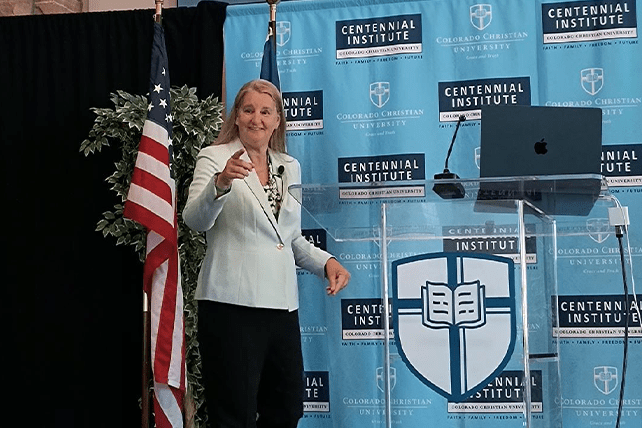“Children are always being formed by something,” said Morell. “Technology forms self-focused consumers who think life is about entertainment and self-gratification.” By “exiting” technology and entering the real world, she argued, people can reach their “highest potential in service to God and country, and our society can witness true human flourishing.”
Jean Twenge: Smartphones Created a Sudden Cultural Shift
Jean Twenge, who teaches psychology at San Diego State University, has devoted her career to researching generational shifts in behaviors and attitudes. Although those trends are usually gradual, sudden changes appeared in 2011 and 2012—the same time that most Americans owned a smartphone. That marked the fastest adoption of any technology in U.S. history, Twenge said, and the impacts on youth have been devastating.
Teenagers feel left out and lonely, say they don’t enjoy life, call life useless, and face skyrocketing rates of clinical depression and self-harm. This occurred before the pandemic, Twenge said, so it’s incorrect to blame the youth mental health crisis mostly on COVID.
With teens spending, on average, more than five hours per day on social media, key activities are being squeezed out. Twenge said young people aren’t socializing in person, sleeping enough, exercising, participating in as many religious activities, or engaging with print media. All those activities are scientifically proven to boost happiness and protect against suicidal ideation.
Twenge’s latest book, “10 Rules for Raising Kids in a High-Tech World,” explains how parents can protect children from addictive-by-design smartphones and social media. For example, she recommends no social media until age 16 and no devices in bedrooms overnight (even for adults).
Because today’s kids are more insulated and isolated, Twenge said, they need real-world experiences and independence to prepare for adulthood. “The best cure for anxiety is experience,” she said, touting the website LetGrow.org. Technology isn’t all bad, Twenge said, but we must find ways for it to “lighten our way, not darken it.”
During a Q&A session, Twenge cited efforts to hold social media platforms and tech creators accountable for the damage they cause. For example, she has testified in cases involving artificial intelligence chatbots that encourage kids to attempt suicide.
RELATED: John Stonestreet: God’s Image-Bearers Must Defend Human Dignity
People should seek other ways to communicate, Twenge said, while reducing their dependence on smartphones and platforms. Although the researcher didn’t discuss theology, a summit attendee described tech use as a spiritual issue. Citing Jeremiah 17:9—“the heart is deceitful above all things”—he urged parents to disciple, prepare, and equip kids and to focus on their internal well-being.

